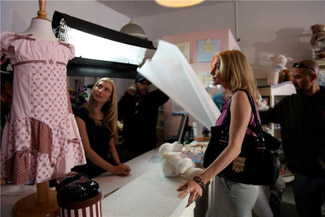Movie Review: Answers to Nothing
By Matthew Huntley
December 8, 2011
BoxOfficeProphets.com

At its core, the film is about people trying to better themselves. Each has flaws and is at a critical stage where they are ready to take corrective action. The superficial pleasures in life - sex, shopping, video games - aren’t cutting it anymore and they’re beginning to realize that discipline and selflessness are the keys to redemption. They’re just scared to take the first step, probably because they know how much pain and effort it’s going to take before they can begin to reach happiness. But right now they’re at a loss for meaning, and without meaning, one finds little reason to survive.
The characters consist of a diverse and hedonistic group of people living in Los Angeles (a common city for this type of story). Tying them together is their essential lack of courage. It’s interesting, but it’s not our caring for these people that keeps us involved in them, but rather our hope they’ll find the fortitude to change so we can at least begin to care about them. We want them to find answers, but the film doesn’t promise us they will, which makes it more compelling.
Writer-director Matthew Leutwyler covers the broad types of people in L.A., but they’re not stereotypes. The characters are drawn and performed well enough so they could be real people, which make their connections more convincing and easier to accept. Ryan (Dane Cook) is a psychiatrist, married to Kate (Elizabeth Mitchell), a lawyer. She desperately wants to conceive a baby, but she senses Ryan is drifting away, and she would be right - he’s having an affair with Tara (Aja Volkman), an up-and-coming musician.
In court, Kate is representing Drew (Miranda Bailey), who drove drunk one night and got into an accident with her brother, a marathon runner who’s now paralyzed and presumably brain dead. Drew is in a legal battle with her parents because she wants to remain Eric’s primary caregiver. She’s training for the SoCal marathon by pushing her brother around in an adult stroller, mostly as a means to ward off her guilt.
These and other stories are set against a backdrop of a missing girl case that dominates the local news. Frankie (Julie Benz) is the detective assigned to the investigation and she has a personal stake in it because she has a young daughter of her own. Jerry (Erik Palladino) is another local cop who frequents funerals and carries around obituaries. What he’s searching for, we’re not entirely sure. He lives next door to a middle school teacher, Carter (Mark Kelly), who pays close attention to the missing girl case and routinely takes part in an online role-playing game. Soon, he begins to link the game to his own life.
Other characters exist mostly to offer different views of the world, like Allegra (Kali Hawk), a misanthrope and one of Ryan’s patients who’s not too shy to voice what she hates about the world. She seems to be stuck in a perpetual state of anger and bitterness. And Barbara Hershey plays Ryan’s mom, who’s either in denial about her estranged husband coming home or just has a lot of faith that he will. She plays Christmas music in June because it makes her happy. “Why wait to be happy?” she asks.
As we expect, several of these characters cross paths, but their encounters are less plot-driven and more random. Though there’s an inevitable degree of contrivance to them all, they’re played straight and don’t necessarily have a causal effect. We’re simply there to observe them in order to study the characters’ behavior. What makes them intriguing is our wondering where they’re taking us, if anywhere. Or perhaps they’re simply meant to provide a moment of reflection. Either way, that’s better than leading us down a conventional path where each scene has a definite reason and logic. The point of the film, I think, is to say that life is not always governed by reason or logic; the world is naturally out of control and we have to make things happen.
There are many praiseworthy things about Answers to Nothing, including the performances, which are genuine and unaffected. The actors resist tacked on drama and they’re sympathetic and credible. But the greater purpose of the movie isn’t always clear and we wonder what the film is saying that we don’t already know. It’s more of a reinforcement than an awakening. And the climax, which circles back to the missing girl case, is a misfire because it descends into traditional thriller mode. It’s intercut with a rock concert and the complementing effect feels forced. I understand the overall message, but it’s been said before, and here it feels redundant and inconsequential.
On a positive note, Matthew Leutwyler shows a lot of promise as a director. He doesn’t have many high-profile credits to his name, but he shows he’s capable of directing actors and weaving a multi-threaded narrative. Perhaps with his next film, he can write a story that’s more original and meaningful in the current cinematic landscape. Answers to Nothing is always interesting to watch but it’s not essential.